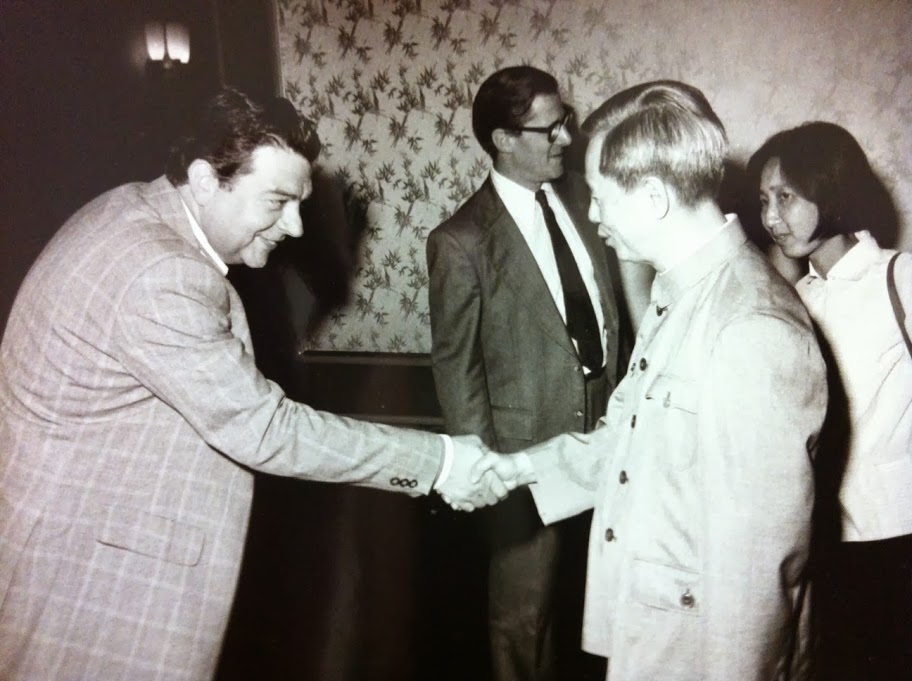During the course of working on the Bodmer archive it has become clear that the collection documents not only the scientific work undertaken by Sir Walter and Lady Julia Bodmer in research laboratories across the world, but also how science and scientists dealt with the great geopolitical issues of the latter half of the twentieth century.
This is well illustrated by the collaborative initiatives and visits conducted by scientists from both the East and the West during the Cold War. Walter Bodmer and fellow scientists undertook many such visits: an example of this being a Royal Society delegation led by Dr Michael Stoker, then Director of the Imperial Cancer Research Fund and Foreign Secretary of the Royal Society, to China between 17 July and 2 August 1978 (the first formal Agreement on scientific exchanges between the Royal Society and the Chinese Academy of Sciences being signed in November of that year).
Along with Michael Stoker, the delegation comprised of Professor Walter Bodmer, Professor Sir Cyril Clarke, Professor Sir Richard Doll, and Professor Avrion Mitchison. Elizabeth Wright, Director of the Great Britain-China Centre, acted as advisor and interpreter as she was fluent in Mandarin Chinese (her language skills were particularly important to the team when they visited the south of China where Cantonese is spoken).
 |
| Group photo including Vice-Premier Fang Yi, Elizabeth Wright, Walter Bodmer, Cyril Clarke, Richard Doll and Michael Stoker, 23 Jul 1978 |
As the report produced on the visit states, ‘though labelled as oncology we covered a fairly wide range of subjects from cell biology and genetics, to general clinical medicine, and back to butterflies, (the last two Sir Cyril Clarke’s interests)’.
Bodmer’s own contribution to the report gives a ‘General Impression of Science in China’ in which he summarised, ‘it is clear that in most areas with which we had contact the Chinese are very far behind the western world in their biomedical research, but keen to catch up and have all the contacts needed for this…the Chinese appear to have had an effective hiatus for almost ten years in basic research and also in university training.’
China at the time was just opening up to the outside world following the end of the Cultural Revolution and the downfall, orchestrated by Premier and Chairman Hua Guofeng, of the Gang of Four in October 1976. By 1978, with the emergence of Deng Xiaoping as the real power in China, reforms were well under way. In March of that year the National Science Policy Conference was held in Beijing. In a speech to the assembled 6,000 scientists and science administrators the by now Vice-Premier Deng declared science to be a productive force in society (contrary to the thinking of Chairman Mao Zedong and the Gang of Four) and that the Four Modernisations of agriculture, industry, national defence, and science and technology were central to China’s economic rejuvenation.
On Sunday, 23 July the Royal Society delegation met Vice-Premier Fang Yi, Minister in charge of the State Scientific and Technological Commission, who also spoke at the National Science Policy Conference and in the following year was to become President of the Chinese Academy of Sciences. In Bodmer’s own personal journal of the visit he records, ‘First shake hands, pictures taken individually, then a group…pleasantries and then a sort of seminar on the role of immunology in cancer, a point raised by FY. We emphasised the importance of basic research and not to hope for too much…discussion about the exchange programme with Michael [Stoker] emphasising the need for high quality science and English’.
Whilst in China, Bodmer himself visited the Academy Institute of Genetics, Beijing; the Medical Academy Institute of Oncology; the Fudan University Institute of Genetics, and HLA Workers, Shanghai; the Institute of Oncology, Canton; and undertook a rural visit to a pharmaceutical factory in Zhongshan [Chungshan] County. Of the Institute of Genetics, Bodmer records, ‘It was established in 1951. Before the liberation there were no institutes of genetics, only some professors in universities. Initially the institute was just a department mainly of plant genetics, was more formally established in 1959 to include animal genetics and after 1960 microbial genetics, at which time there were 100 people. Now the research personnel is 250…There are 5 departments which had been “adjusted” after the Gang of Four was smashed. This is the first of so many references to the difficulties that basic research faced under the Gang of Four when, it seems, many workers were simply not allowed to do any basic research and either simply studied political theory or went out to do practical work in the fields’.
Despite these limitations Bodmer’s conclusions where on the whole positive, in his ‘General Impression’ Bodmer notes that, ‘Admittedly, it might seem all too easy to blame everything on the Gang of Four, but my impression certainly is of a really major setback during the ten years from 1966 to 1976. The able scientists and leaders now are a handful of those who were active before 1966 and who generally have had some training outside China’. In a paper co-authored with Sir Cyril Clarke entitled ‘Medical genetics in China’, published in the Journal of Medical Genetics in 1979, Bodmer concludes, ‘Our overall impression was that though there was some good work being done, the Chinese often wanted to run before they could walk, a phenomenon also not unknown in the UK’.
The material in the archive relating to this visit is only one example of a large number of papers relating to collaborations and visits between scientists at periods of great cultural and political change. Similar material documents future visits of Chinese scientists to the United Kingdom and the fostering of further links between the Royal Society and the Chinese scientific community. Included in the archive are also papers relating to the impact of the end of the Cold War in Europe and the breakup of the Soviet Union, along with a significant series relating to HLA workshops and conferences.
